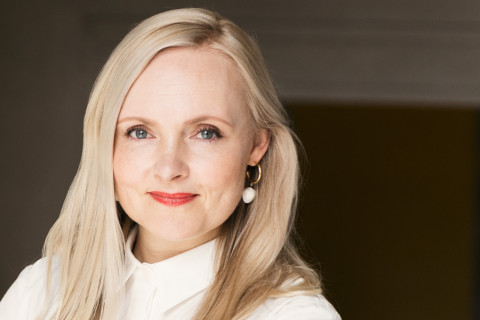Minister of the Environment and Climate Change Maria Ohisalo will be returning from parental leave on 7 June, and she has her calendar full at the end of the second week of June. After attending a parliamentary question time, she will travel straight to Kuopio for the doctoral conferment ceremony of the University of Eastern Finland, and from there to the opening ceremony of Salla National Park. The doctoral conferment ceremony has been postponed twice due to the pandemic, but luckily now, the minister has time to attend the traditional academic festivities. She defended her dissertation in 2017.
“I look forward to seeing how many fellow researchers from my time at the university I’ll meet at the ceremony. It is great to experience these academic customs, which are otherwise not visible in people’s daily life.”
Ohisalo began her doctoral studies at the University of Eastern Finland in 2012. Her doctoral dissertation focused on Finnish charity food aid, subjective well-being, and disadvantage. Themes relating to inequality captured her interest already when she was a young student at the Faculty of Social Sciences in the University of Helsinki.
“I’ve always been fascinated by inclusion and exclusion, and how they are visible in society.”
After completing her Master’s degree, Ohisalo’s first job dealt with issues related to homelessness. As Minister of the Environment and Climate Change, Ohisalo is also responsible for housing, getting to address themes that are familiar to her.
“A key question for the minister responsible for housing is whether there is enough affordable housing available in Finland. Helsinki plays a crucial role in eliminating homelessness in Finland. The City of Helsinki has made a historic commitment to eliminating homelessness by 2025. The Government Programme, on the other hand, is committed to cutting homelessness by half during this government term.”
Research-based knowledge plays an important role in decision-making
Ohisalo’s previous career as a researcher has given her a lot as a politician. In her role as a minister, she recognises the role of research-based knowledge in informing decision-making. The networks established during her years in academia include experts who can provide current and the most recent research evidence to be used as a basis for decision-making.
“During my years at the university, I forged many important contacts that have been useful in policy-making. In my work as a minister, I don’t have time to look up all research myself. As a politician with a background in research, I have also demanded that decision-making be better informed by it.”
In her current role, Ohisalo wants policy-making to be based on research-based knowledge and expert opinion.
“Policy-making is something that can’t be done alone. It is important to be able to listen to what society is telling us, gather information from different sources, and make informed decisions. Transparency of information, utilisation of data, and hearing expert opinions are important in policy-making.”
As a researcher, Ohisalo has been heard by the Finnish Parliament’s Employment and Equality Committee, and she has given talks and commentary in various parliamentary networks.
Unique data on Finnish bread lines
Ohisalo’s doctoral dissertation was inspired by a joint project between the University of Eastern Finland and the City of Kuopio in 2012, which focused on the well-being and ill-being of people relying on charity food aid. The project led by Professor Juho Saari expanded when Socca, the Centre of Excellence on Social Welfare in the Helsinki Metropolitan Area, carried out further studies in Helsinki, Espoo and Vantaa in autumn 2012.
“I was working for Socca at the time, and Juho Saari told me about the study in Kuopio. We got excited and started collecting data in the capital region as well.”
The project resulted in unique data on Finnish charity food aid. Around 3,500 people from all over the country responded to the survey.
“In 2016, we repeated the survey in Helsinki, because we wanted to see whether the trends were similar. This confirmed earlier findings and that the data collected at different times were consistent.”
Ohisalo got involved in politics already when writing her doctoral dissertation. Among other things, she chaired the Federation of Green Youth and Students in 2013–2014 and was the vice chairperson of the Greens in 2015–2019.
“When I was younger, I always said I would never become a researcher or a politician. My career is a testament to the fact that life cannot be planned. When the right opportunities arise, seizing them can lead to interesting things.”
Networks provided new perspectives to research
Ohisalo defended her doctoral dissertation on the Kuopio Campus, though doing most of her research and writing in Helsinki. During her years at the University of Eastern Finland, she became integrated into a broader research community through being involved in various research networks. Among those networks, Ohisalo looks back especially fondly on the “Pieksämäki School”, a network of researchers who used to meet annually to discuss issues related to inequality from the perspective of different disciplines.
She and fellow doctoral student Tuomo Laihiala, who nowadays works at the University of Helsinki, formed the “East Helsinki Department of the University of Eastern Finland” between 2014 and 2017.
“It was a force that kept my research afloat. After all, researchers often work independently and alone. There are few opportunities for informal exchange of ideas, although it is precisely in informal settings where the best ideas and insights are born.”
What Ohisalo especially misses from academia is delving into matters and getting to the bottom of things, which is something politicians rarely have time for.
“We work on several different themes at a time. But I have enjoyed this, too. My education and the years spent in academia have been a great opportunity. This is why I wish to thank the university for being so flexible, allowing someone like me, who was mostly based in Helsinki, to defend my dissertation in Kuopio.”
Photo: Iris Flinkkilä.



